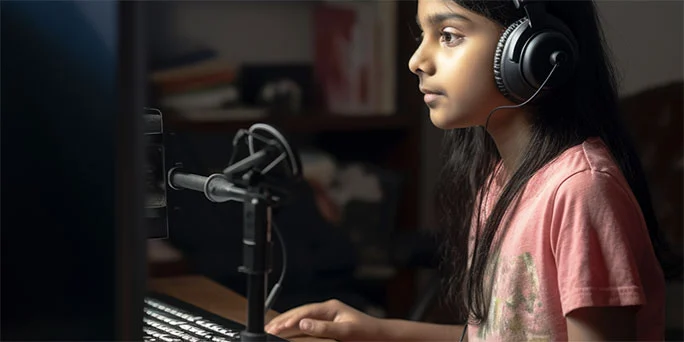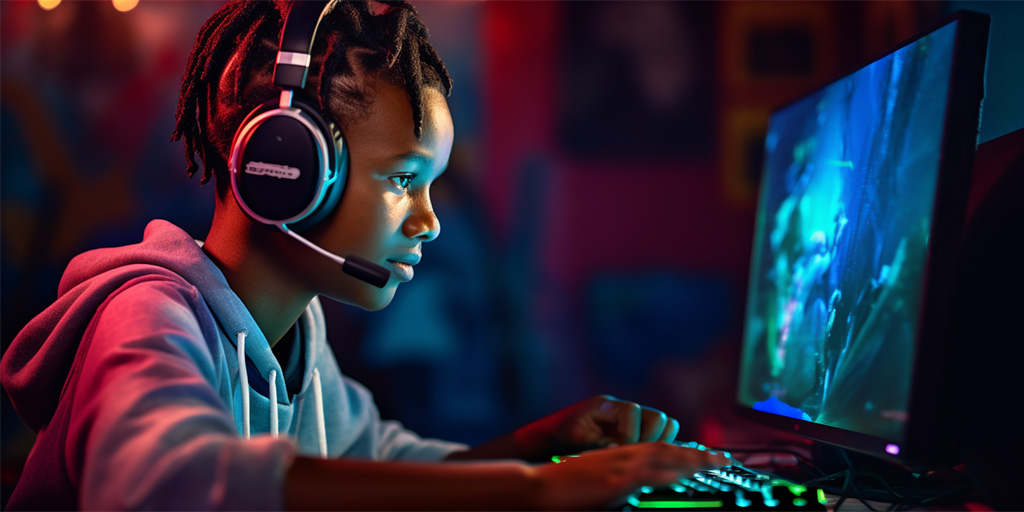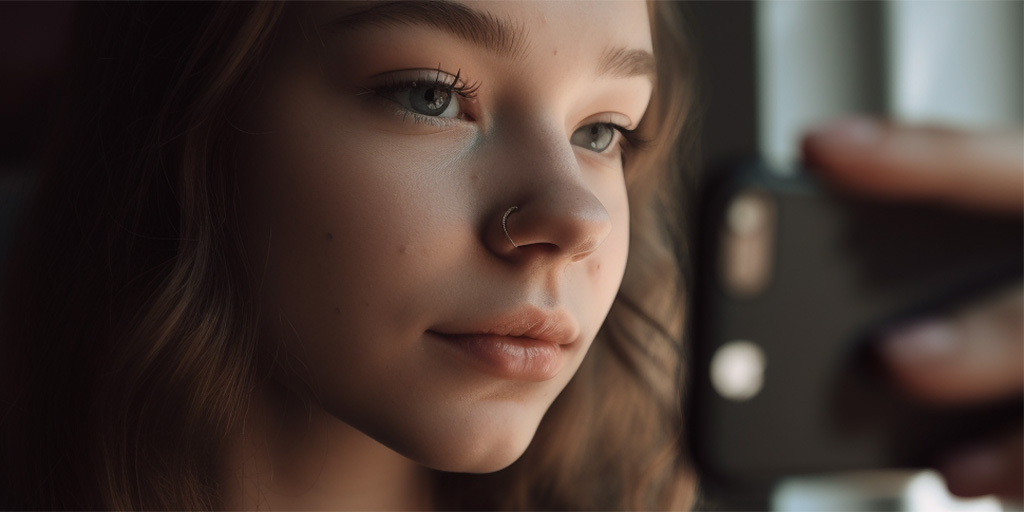
What do kids today aged 8-12 want to be when they grow up? According to a 2019 Harris / LEGO poll, it’s a “YouTuber” (the nickname for content creators on YouTube), by a country mile. And many kids don’t even want to wait that long — they want to launch their YouTube career now.
They might be inspired by watching popular YouTube channels hosted by kids like Ryan Kaji or Nastya Radzinskaya, or by teens like Evan Moana and Karina Kurzawa. Or they love watching uber-popular adult YouTubers like Mr. Beast, Lilli Singh, or the five friends of Dude Perfect. Maybe their friends at school are YouTubers, and they don’t want to be left out. Or they just want to share their own ideas and creativity with the world.
While many child and adult YouTubers have had positive experiences, many others have expressed regrets at starting a YouTube channel. They feel overwhelmed and burned out from the relentless schedule, constant pressure, and negative attention and criticism — including some very successful YouTubers.
While there are certainly benefits to allowing your child to create content for YouTube, there are also many potential risks. In this article, we’ll explore both sides and provide recommendations to manage the risks.

Developing skills: Creating content for YouTube requires a variety of skills, including planning, writing, editing, and public speaking. By becoming a YouTuber, your child can develop these skills and become more confident in their abilities. It could help shape their future career interests — not as a YouTuber necessarily, but as a writer, video editor, marketer, or content creator.
Instilling a strong work ethic: Most YouTubers — kids or adults — put in a lot of effort to make it look like they’re not putting in a lot of effort making their videos. Building and maintaining a successful YouTube channel is a LOT of work: you have to publish compelling, high-quality content on a consistent basis, respond to comments and feedback, and keep on top of trends and new ideas. This might help a child who doesn’t seem motivated by anything to develop a good work ethic.
Building an audience: YouTube is one of the largest social media platforms in the world, and creating content can help your child build an audience. This can be a great way for them to connect with other kids who share their interests and passions.
Learning how to take negative feedback: You can choose whether to allow comments on your child’s YouTube channel (leaving comments on increases the chances the videos will get more views, because YouTube’s algorithm prioritizes content with high engagement). But if you allow them, your kid is likely to get criticism as well as praise. YouTube viewers are not shy about telling you what they think, especially since the commenters are usually anonymous. This feedback can help kids learn how to accept or reject criticism, a skill they’ll need to learn to successfully navigate life as an adult. But you should make sure to monitor your child’s comments so you can help them keep the feedback in perspective.
Monetization: While making money should not be the primary motivation for creating content on YouTube, successful YouTubers can make a significant amount of money through advertising revenue, sponsorships, and merchandise sales. It’s important to set realistic expectations with your child, though, because the vast majority of YouTubers make very little money.
Creative outlet: Creating content for YouTube can be a fun and creative outlet for your child. It can be a great way for them to express themselves and share their ideas with others who may have similar interests.

Online safety: As with any online activity, there are risks associated with sharing personal information on YouTube. Parents should make sure that their child is aware of the risks and knows how to protect their personal information.
Cyberbullying: Unfortunately, cyberbullying is a common problem on social media platforms like YouTube. Parents should monitor their child’s comments and be prepared to handle any negative comments or messages they may receive, such as reporting or disabling comments.
Sexism, racism, and other hate messages: Beyond the normal sorts of negative comments, creating a YouTube channel with comments turned on opens your child up for all sorts of hate messages based on their race, gender, physical characteristics, disabilities, or any other perceived difference. Girls and women are more likely to experience sexual harassment online, which adds another problematic layer if your tween or teen girl wants to become a YouTuber.. Make sure you and your child are prepared for this, and know how to handle it.
Time management: Creating content for YouTube can be a time-consuming activity. Parents should make sure that their child is balancing their YouTube hobby with other activities, such as schoolwork, sports, and socializing with friends.
Content control: As a parent, you may be concerned about the content that your child is creating and sharing on YouTube. It is important to have open and honest conversations with your child about appropriate content and to monitor their videos to make sure that they are not sharing anything inappropriate.
Disappointment: Many people create YouTube channels only to give up on them when they can’t attract more than a few views on each video. It takes a lot of time and work for most YouTube channels to gain traction, and even then, there’s no guarantee. If your child struggles with anxiety or self-esteem issues, or has difficulty accepting failure, this could be a blow to them. On the other hand, learning to accept failure is a part of life, so it could be a good learning opportunity — it depends on the child and their emotional resilience.

If you decide to allow your child to create a YouTube channel, there are several steps you can take to manage any potential risks:
Set ground rules: Before your child starts creating content for YouTube, set some ground rules. These might include guidelines around the types of content they can create, how much time they can spend on YouTube, and whether to allow comments and how they should handle them.
Monitor their activity: As a parent, it’s important to monitor your child’s activity on YouTube. This includes checking their videos and comments with an app like BrightCanary or another method, as well as monitoring their time spent on the platform.
Educate them about online safety: Make sure that your child understands the risks associated with sharing personal information online and knows how to protect themselves. This might include teaching them about privacy settings and how to handle negative comments or messages.
Encourage open communication: Encourage your child to talk to you about their experiences on YouTube. Make sure that they feel comfortable coming to you if they have any concerns or if they receive any negative comments or messages.

Whatever you decide, it’s important to have an open and honest conversation with your child about it. Here are some tips for how to talk to your child about becoming a YouTuber:
Explain your concerns: Start the conversation by explaining your concerns about allowing them to create content for YouTube. Make sure that your child understands the risks involved and why you’re concerned.
Listen to their perspective: After you have shared your concerns, invite your child to share their thoughts. Ask them why they want to become a YouTuber and what they hope to gain from the experience.
Set ground rules: This might include guidelines around the types of content they can create, how much time they can spend on YouTube, and how they should handle negative comments or messages.
Consider making the channel private: For young children especially, this could be a great option that allows them to pursue their passion but only with people they know in real life. If you set the privacy settings on the channel so that everything is private or unlisted, only people you invite to follow the channel will be able to see the videos and comment on them.
Make a commitment to watch their videos: Put a set time on your calendar that you’ll watch every week if necessary. This ensures you’ll be your kid’s #1 fan — if they’re not at the stage yet where your participation embarrasses them — and you can keep on eye on what they’re posting and the feedback they’re getting (or not getting) so you can have conversations about both.
Support their passion: If you decide to allow your child to become a YouTuber, make sure that you are supportive of what they want to create content about. If your decision is no, find other ways to support their passion, such as signing them up for theater or broadcasting classes, or encouraging them to join related programs or clubs at school.
Set a time to revisit the decision: If you give your kid the green light now, you still want to reserve the right to reverse that decision if it’s having a negative impact on them. Tell your child you’ll have regular check-ins on whether this still makes sense — possibly every month at first, then every three or six months down the road. If you don’t allow them to become a YouTuber now, set a time when you’ll reconsider — in six months or a year, for example, or when they reach a certain age.
As a parent, it’s important to weigh the benefits and risks when making a decision about whether to allow your child to become a YouTuber. It’s also important to have open and honest conversations with your child about their experiences and to make sure that they are taking care of their mental and physical health. If you decide to allow it, you’ll leave yourself the most options if you frame it to your child as an experiment that you’ll revisit down the line. Creating a YouTube channel could be a great learning experience, or it could lead to burnout or other issues. Either way, keep discussing it as a family.